H2O News has a short video clip on the Guardini Foundation meeting with the Pope.
Sacred Liturgy & Sacraments: October 2010 Archives
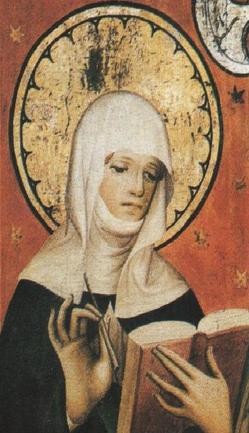 On Wednesday, October 27, Pope Benedict XVI noted that in
the Great Jubilee of the Year 2000, the Venerable Servant of God John Paul II
proclaimed Saint Bridget of Sweden (1303-1373), co-patroness of the whole of
Europe. It's the hope of all of us, as Benedict indicated, that Saint Bridget
"...can intercede effectively before God, to obtain the much-awaited grace of the
full unity of all Christians. We want to pray ... for this same intention, which
we consider so important, so that Europe will be able to be nourished from its
own Christian roots, invoking the powerful intercession of St. Bridget of
Sweden, faithful disciple of God, co-patroness of Europe."
On Wednesday, October 27, Pope Benedict XVI noted that in
the Great Jubilee of the Year 2000, the Venerable Servant of God John Paul II
proclaimed Saint Bridget of Sweden (1303-1373), co-patroness of the whole of
Europe. It's the hope of all of us, as Benedict indicated, that Saint Bridget
"...can intercede effectively before God, to obtain the much-awaited grace of the
full unity of all Christians. We want to pray ... for this same intention, which
we consider so important, so that Europe will be able to be nourished from its
own Christian roots, invoking the powerful intercession of St. Bridget of
Sweden, faithful disciple of God, co-patroness of Europe."In his address the
Pope noted something that I think is quite interesting, perhaps quite bold to
say, even if it is the teaching of the Church, that married couples are to help
each other get to heaven: "to advance in the Christian life." Our Catholic
teaching on marriage is that man and woman are to form a "conjugal
spirituality" that is "follow a path of sanctity." The two pertinent paragraphs
of a longer address are here:
"Bridget, spiritually guided by a learned
religious who initiated her in the study of the Scriptures, exercised a very
positive influence on her own family that, thanks to her presence, became a
true "domestic church." Together with her husband, she adopted the
Rule of the Franciscan Tertiaries. She practiced works of charity towards the
indigent with generosity; she also founded a hospital. Together with his wife,
Ulf learned to improve his character and to advance in the Christian life. On
returning from a long pilgrimage to Santiago de Compostela, taken in 1341 with
other members of the family, the spouses matured the plan to live in
continence, but shortly after, in the peace of a monastery to which he had
retired, Ulf concluded his earthly life.
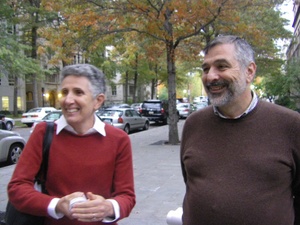
The first period of Bridget's life
helps us to appreciate what today we could define an authentic "conjugal
spirituality": Together, Christian spouses can follow a path of sanctity,
supported by the grace of the sacrament of Marriage. Not infrequently, as
happened in the lives of St. Bridget and Ulf, it is the wife who with her
religious sensibility, with delicacy and gentleness, is able to make the
husband follow a path of faith. I am thinking, with recognition, of so many
women who, day in day out, still today illumine their families with their
testimony of Christian life. May the Spirit of the Lord fuel the sanctity of
Christian spouses, to show the world the beauty of marriage lived according to
the values of the Gospel: love, tenderness, mutual help, fecundity in
generating and educating children, openness and solidarity to the world,
participation in the life of the Church."
When was the last time you heard a priest speak of marriage in such a beautiful way? That husband and wife not only love each other, raise children, and are active members of the Church but also see to it that the other spouse intimately know the person of Jesus Christ. How important it is to realize that we have to help each other see God face-to-face!!! When we learn the lesson that indeed heart to speaks to heart in marriage in Christ, then will the renewal of the Church happen.
My soul is deprived of peace, I have forgotten what happiness is; I tell myself my future is lost, all that I hoped for from the Lord. (Lamentations 3:17)
These words are put on our lips at the funeral liturgy. We understand these words at the depths of our being not only at the time of someone's death, but for many, many days ahead in dealing with the loss of a loved one. Time without the decedent can seem ugly, deprived, and hopeless. The author of Lamentations has it right: life can be very bleak. This would indeed be desperate if these words were the only ones we heard and remembered.
This reading from Lamentations also says, My portion is the Lord, says my soul; therefore will I hope in him. Good is the Lord to one who waits for him, to the soul that seeks him; It is good to hope in silence for the saving help of the Lord.
Continue reading Praying for the dead, All Souls .
Jesus says to his disciples, ask the Lord to send workers into his harvest (MT 9:38).
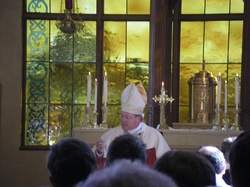

Earlier today I attended the Sacrifice of the Mass celebrated by His Excellency, the Most Reverend Michael R. Cote, Bishop of Norwich and Chancellor of Holy Apostles Seminary (Cromwell, CT), where he also instituted 27 seminarians in the ministries of Lector and Acolyte. These men of various ages, life experience and affiliation, are preparing for service as priests.
This was the first time these rites were performed in the new seminary chapel.
These rites are minor, but essential in the life Church as she prepares men for service as priests. All of these men have been reading the sacred Scripture at Mass and serving and bringing Holy Communion to the people. But now, they are more official in their service for without these rites they can't be advanced to the Order of Deacon.
The Church commissions those instituted as lector with these words:
Take this book of Holy Scripture and be faithful in handing on the Word of God, so that it may grow strong in the hearts of His people.
And, for those instituted as acolytes:
Take these vessels with bread and wine for the celebration of the Eucharist. Make your life worthy of your service at the table of the Lord and of His Church.
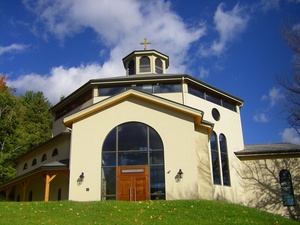
Bishop Cote reminded all the seminarians that as ministers of God and of the Church they are to read the signs of the times, to think with the Church, to share the Good News of the Lord and to signs of mercy for the faithful. He emphasized that priests and deacons and other ministers are to be gentle shepherds of the Gospel: nothing harsh, nothing repelling when it comes to teaching the faith and exercising the pastoral office.
My friend and neighbor, Ken Dagliere, a seminarian for the Archdiocese of Hartford was one of the men given ministry of acolyte. His new ministry allows him to officially serve at the altar, expose and repose the Blessed Sacrament and cleanse the liturgical vessels if a deacon or priest is not available.

Driving to and from the seminary there was a tangible experience holiness and the feeling of rightness of the event just lived: not only did I sense the presence of the Holy Spirit but also the graces of friendship and the beauty of the horizon revealed the face of God. New England color is particularly revealing of God's interest in our lives. You know when something is "just right," "just what it's supposed to be." Saint Catherine of Siena tells us that we know that grace is at work in our lives when we are who we are meant to be; in another vein: we are to strive to be what God has made us to be. It is an awareness of the Divine Plan in our lives. And so today, 27 seminarians, visiting priests and laity with the bishop asked the Holy Spirit once again make hallow the lives those called to priesthood. But lest we forget that all people have vocations: some it's priesthood, for others it's teaching, and others the lay life in its multiplicity of works; all are called to seek the face of Christ and to live the Gospel and the sacraments.
May Mary, Queen of the Apostles and seminarians, pray for Ken and the other seminarians as they continue their formation for priesthood.
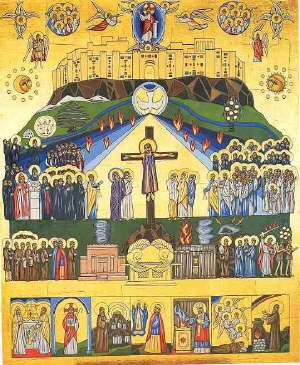 Autumn is upon us with its mix of weather: recent days
there's been warmth and coolness, rain, clouds and sun. The earth is adjusting and so are we, at least liturgically. Judging by the liturgical calendar of the Catholic Church we are
near the end of the liturgical year with the First Sunday of Advent only a few weeks away. Some churches, like the Maronites in
particular, mark this time of the liturgical year by counting weeks after the
Exaltation of the Cross in a time called the Season of the Cross. This particular season of the Maronite liturgical calendar prepares us to account for our lives by looking to our personal final victory through prayer, fasting, waiting, and conversion of life. The rich liturgical theology of the Maronite Church ought to draw us more closely to the glory of the Lord's right side in an attitude of gratitude for all things in life.
Autumn is upon us with its mix of weather: recent days
there's been warmth and coolness, rain, clouds and sun. The earth is adjusting and so are we, at least liturgically. Judging by the liturgical calendar of the Catholic Church we are
near the end of the liturgical year with the First Sunday of Advent only a few weeks away. Some churches, like the Maronites in
particular, mark this time of the liturgical year by counting weeks after the
Exaltation of the Cross in a time called the Season of the Cross. This particular season of the Maronite liturgical calendar prepares us to account for our lives by looking to our personal final victory through prayer, fasting, waiting, and conversion of life. The rich liturgical theology of the Maronite Church ought to draw us more closely to the glory of the Lord's right side in an attitude of gratitude for all things in life.You'll hear Maronite liturgical theology speak of
Jesus' Cross as "the Cross of Light," the symbol -the reality-- par excellence of
the victorious Son of Man and Son of God. The cross of is that primary sign by
which Jesus Christ, Our Lord, becomes for us the victor over death and opens
the gates of heaven for our entrance into blessedness with God the Father, God the Son and God the Holy Spirit.
The Maronite Church
prayed today: When you shall appear on the last day the sign of the cross shall
shine brighter than the sun, enable us, your worshipers, to enter your kingdom
of light, and glorify and thank you, O Christ, with your father, and your Holy
Spirit, now and forever.
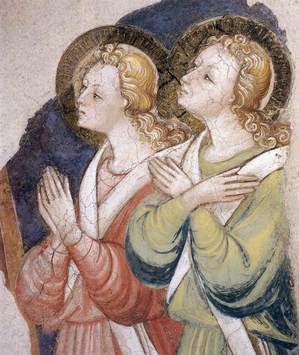
Behold, I send an angel before you, to guard you on the way and to bring you to the place I have prepared. Give heed to him and hearken to his voice, do no rebel against him, for he will not pardon your transgression; for my name is in him. (Exodus 23:20)
We pray:
O leaders of the heavenly armies, although we are always unworthy, we beseech you that with your prayers you may encircle us with the protection of the wings of your angelic glory. Watch over us as we bow low and earnestly cry out to you: Deliver us from trouble, O princes of the heavenly armies.
Plus,
Angel of God, my Guardian dear, to whom His love commits me here, ever this day (night) be at my side, to light and guard, to rule and guide. Amen.
See last year's post on this feast of the Guardian Angels for a prayer and a brief catechesis.

